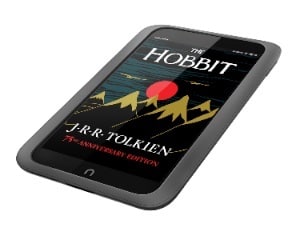Surprise: Hardback Book Sales Overtake E-books Despite iPad and iPhone
![]() Jonathan Stolper, Senior VP for Nielsen Books, recently presented a reported on the “steadily declining unit sales of e-books.”
Jonathan Stolper, Senior VP for Nielsen Books, recently presented a reported on the “steadily declining unit sales of e-books.”
Publisher’s Weekly has the story. “Whatever the causes for the decrease in e-book sales, the decline has resulted in something that many publishing experts thought would never happen—unit sales of hardcovers overtook unit sales of e-books.” Yep, you read that right.
Recall that right after the iPad came out, there was a flurry of interest in e-books. [Back in 2012, I published a six-part series.] We all thought that books on paper might eventually disappear. Some libraries took to preserving their holdings in special vaults, and we all merrily started buying e-books, living the future.
However, the situation has changed. From the article above…
Nielsen found that e-book unit sales from reporting publishers were down 16% in 2016 from 2015. [Meanwhile] unit sales of hardcovers overtook unit sales of e-books. With hardcover units up 5% in 2016 over 2015, hardcover’s 188 million units sold topped that of e-books for the first time since Borders closed in 2012…
Why the Reversal?
The Publisher’s Weekly cites two major causes explained by Mr. Stolper. First, e-book prices have gone up. The return of agency pricing has raised book prices on average by US$3.00. Price is cited as the top criteria for e-book buyers, and that’s been enough, apparently, to give customers pause.

Barnes & Noble Nook.
Second is the increased use of smartphones and tablets compared to dedicated e-book readers like the Barnes & Noble Nook. Wait. Here’s the thing…
Consumers who use dedicated e-book readers have consistently been found to purchase more e-books than consumers who use other devices to read. In the first quarter of 2011, more than 70% of e-book buyers said they used dedicated e-book devices to read, a percentage that fell to 24% in the second quarter of 2016.
Essentially, despite the steadily declining sales of the iPad, the installed base continues to rise, albeit it at a lower rate. And the obsession for e-books purchased by dedicated e-book reader owners is not shared by tablet owners.
In essence, the popularity of tablets like the iPad failed to propel customers permanently into an e-book future. That’s just amazing and explains a lot about this sea change.

iPad as e-book reader. Not so big a deal as presumed.
Other Factors
I surmise from my readings that there may be other factors at play.
- The EPUB and other e-book formats, in general, didn’t evolve fast enough to duplicate the page management, embedded images, cover art and reading experience of a real book. As e-book prices rose, and the hassle of DRM was never resolved, customers chose, more and more, to get the real thing.
- Customers of e-books have slowly became aware of the fact that they don’t have the same First-sale doctrine rights as with paper books. When, thanks to age, they can no longer maintain their account, the e-books and rights to the e-books vanish. Paper books can be passed on to heirs.
- Even standard sized tablets (9.7 – 10 inches) have a hard time displaying advanced textbook material in a fashion that’s equally as useful as paper. And e-book textbooks haven’t saved students a lot of money. Plus, they can’t be resold after use.
Related
The Future of e-books
The first thing I thought when I read this article was, oh no, now Apple is going to lose interest in iBooks. That’s not certain, but we’ve come to learn how Apple thinks. That’s why, years ago, my wife and I elected to focus primarily on Kindle books, our Kindle readers, and not Apple’s iBooks. The thinking was that Amazon will always be in the book business, but perhaps not Apple.
The second thing to consider is that, just like the phenomena described by Publisher’s Weekly, technological change and market forces could turn the tide, back to e-books. For yet new and equally unexpected reasons. One never knows.
Third, it’s good to have a strategy. My own has been to buy e-books when I need them right away for reference. Science fiction books, once read, need not be kept around. But when a book is full of solid reference material and diagrams/photos, such as astronomy, physics, or computer science, I often invest a little more in paper. Our family’s e-book library is structured such that if it were to go poof, it wouldn’t matter.
Finally, a lesson here is that enthusiasm for what seems like cool technological advances doesn’t guarantee future success. Murphy’s law continues to apply in all aspects of our tech life. This one is an amazing case in point.

0 Response to "Surprise: Hardback Book Sales Overtake E-books Despite iPad and iPhone"
Post a Comment